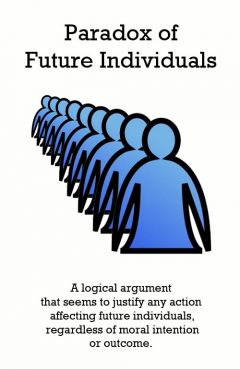Paradox of Future Individuals

Release Date: //1982
Country of Release:
Length:
MPAA:
Medium: Paradox
Genre:
Release Message: A logical argument that seems to justify any action affecting future individuals, regardless of moral intention or outcome.
Description: Also known as the non-identity problem, and offers a logical argument that seems to justify any action affecting future individuals, regardless of moral intention or outcome. Any large-scale change in human behavior will literally change the human race. Addresses our moral obligation to future persons to plan for the future now. In The Paradox of Future Individuals, Kavka presents the example of the slave child. A couple, who has decided not to have any children of their own, are offered $50,000 to create a child for someone else. This child will then be used as a slave. The couple is aware of the state of living that their future child will be put into. If they make this agreement they will use their earnings to buy a yacht. Because they have decided at the moment to not have any children of their own, this child would not exist unless he or she was created to be sold as a slave. æAccording to the extended obligation principle ñOne can have an obligation to choose act or policy A rather than alternative B if and only if (i) if one chose B, some particular person would exist and be worse off than if one had chosen A or (ii) if one chose A, some particular person would exist and be better off than if one had chosen B.î ææAccording to part two of this principle, the decision to create this child to be sold into slavery is moral because a child is given existence who would never have had an existence. When looking at this principle we must consider if mere existence is what should decide a person's fate. If we allowed people to use the principle that mere existence is what matters when bringing future people into the world, what motivation do parents have to protect their future children from any kind of harm? According to this principle, children who are abused and neglected are better off soley because they exist. This error in the extended obligation principle is what brings Kavka to the idea of a restricted life principle.